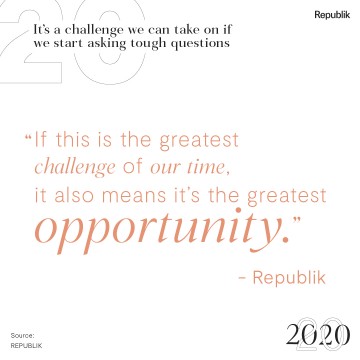As we face a decade of action, we hope these statements inspire your organization to get things moving.
As a certified B-Corp and Global Compact signatory, we do our best at Republik to operate our company following the world’s best guidelines, while influencing our clients to do the same.
This 12-min read reflects our perspective on the global issues we’re facing and the systemic-change solutions needed from our governments, institutions and corporations in order to accelerate the 2030 agenda.
It’s based on some of the world’s most thought provoking lectures and discussions had with Canada’s top thought leaders while attending the Globe Conference, the Social Finance Forum and The Montreal Youth Summit on Sustainable Business over the past couple of months.
The first 9 statements are context-based and the next 11 are solution-oriented.
Published on March 12 2020
Author: Jean-Philippe Shoiry, LL.B M.Tax
Design & illustrations: Tyran Trieu
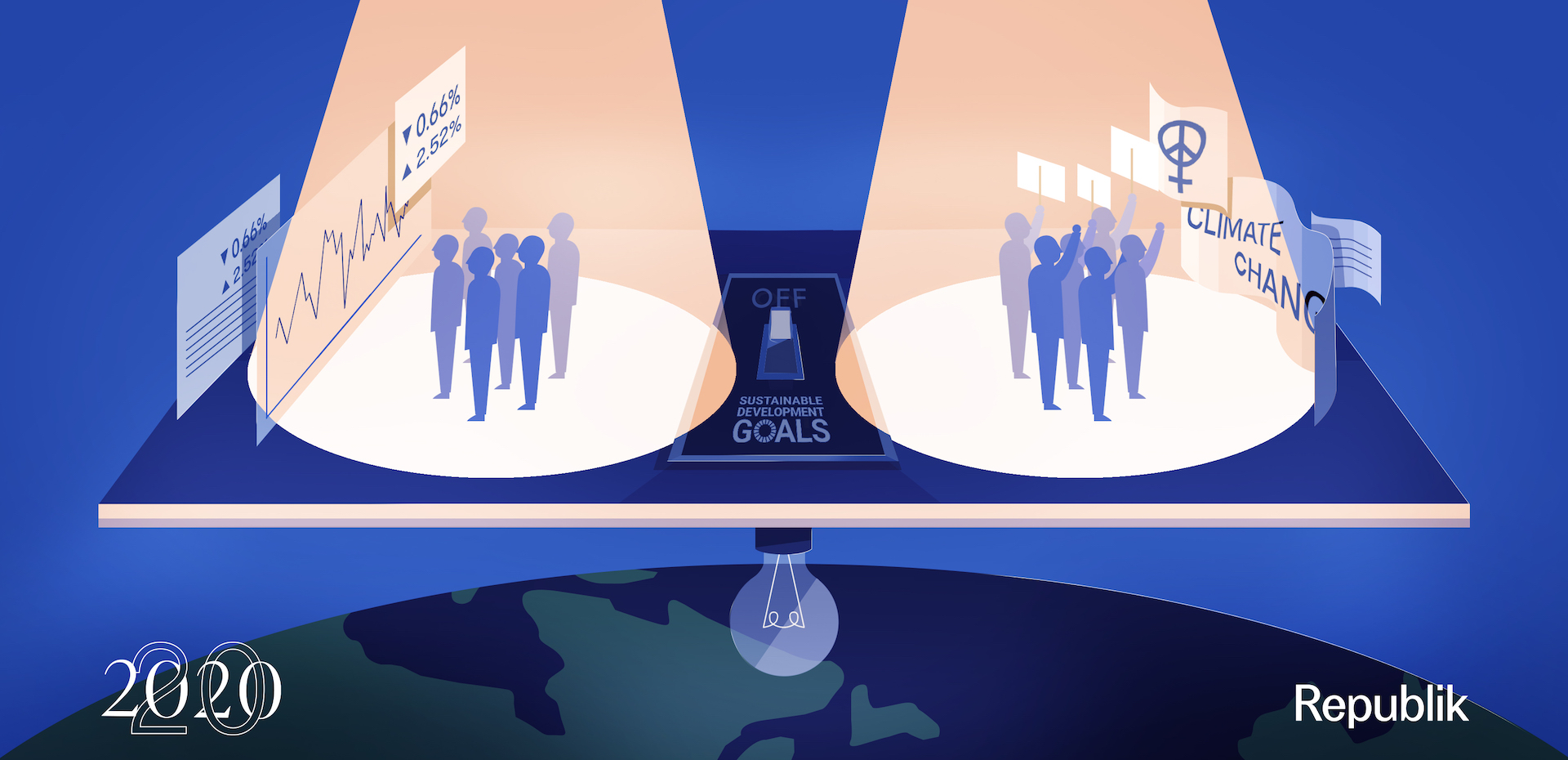
Original artwork by Tyran Trieu
1. We’re extracting too much too fast
The speed at which we got to this point is unprecedented.
We’re living at a pace that’s 1.75X times what the planet can provide and should the global population reach 9.6 billion by 2050, the equivalent of almost three planets could be required to provide the natural resources needed to sustain current lifestyles.
The planet’s growing needs for food, energy and clean water need to be reconciled with what it can actually offer.
This is the greatest challenge of our time.

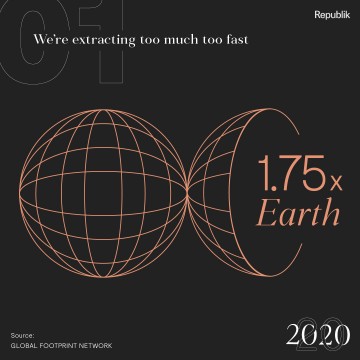
2. Emerging economies will not pass on their piece of the pie
As of today, the 5 biggest polluting countries are accountable for 61% of the planet’s CO2 emission.
We can assume emerging economies such as India, China and Brazil will not reframe their consumption aspirations in the short term since most of their population is eager to finally have a taste at the North-American lifestyle.
The Carbon Map illustrates the difference between responsibility and vulnerability to climate change, taking into consideration historical emissions and the international trade in fossil fuels and other goods.
Our global consumption habits will need to transition while the planet’s biggest population increases theirs.
This challenge will need a new kind of leadership, at all levels.

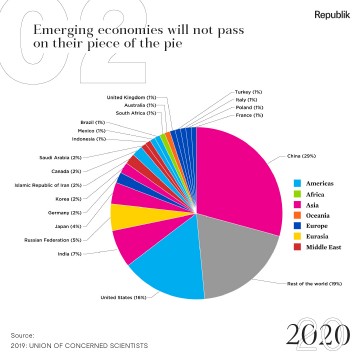
3. A global challenge needs a global plan: the SDG’s
When facing global issues, we need global organizations, public and private, to align their efforts on a common plan.
And so in 2015, the United Nations announced a global agenda for 2030: The Sustainable Development Goals, also called the SDGs or the Global Goals.
Adopted by all United Nations Member States, the SDGs provide a shared blueprint for peace and prosperity for people and the planet, now and into the future. At its heart are the 17 Sustainable Development Goals, which are divided into 169 targets and 232 indicators.
To make these goals actionable, businesses can turn to sister organization, the UN Global Compact, the world’s largest corporate sustainability initiative, which provides tools, education and a network for businesses to accelerate their transition.
Since the adoption of the Global Goals, 5 years have now passed and “No country is on track to meet the milestones set out by the U.N. at launch” according to the U.N. Global Compact.
An interesting ressource to fully understand the context is the world’s first study to see if all SDGs can be reached within the Planetary Boundaries, based on an integrated Global System Model.
Welcome to the 2020s: the decade of action.

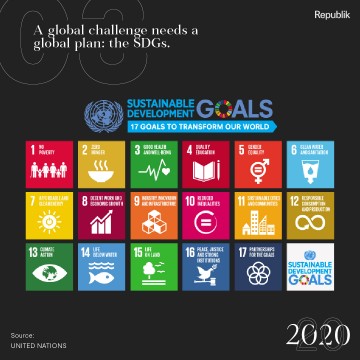
4. The world - and Canada - is more divided than ever
As protectionism leadership emerges everywhere, Canada’s own divisiveness is becoming more apparent every day.
The provincial blame-game play roars as oil and gas-dependent provinces suffer from a decreasing barrel price and lack of transitory commitment to clean energy technologies.
Although Canada announced a commitment to net-zero carbon emissions by 2050, there is no clear energy transition plan in place.
This complex balancing act projects difficult times ahead for politicians at the federal and provincial levels, as our short term political cycle faces unprecedented long term challenges.

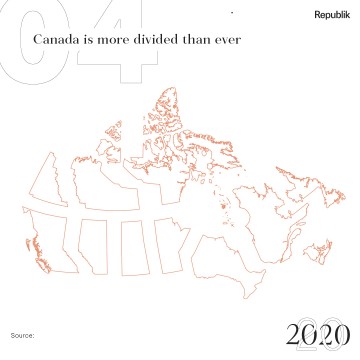
5. Canada’s SDG unit is putting a 2030 plan together
With its vast natural resources, diverse human composition and good international collaboration, Canada has an opportunity to once again become a world leader.
“There can be no plan on fighting pollution if pollution is free.” - Minister Jonathan Wilkinson at Globe Conference 2020
Tasked with coming up with an SDG action plan transversal to all ministries, Canada’s SDG Unit recently came up with the first draft of a plan for 2030: Towards. Canada’s Agenda National Strategy.
As the first step of this plan, Canada’s first national conference on the United Nations Sustainable Development Goals will be held at Laval University’ Together: Ensemble event, from May 20 to 22 2020. This event is set to rotate across provinces over the next 10 years.
With political, institutional and corporate leaders in the same room for a full 3 days this upcoming May, work needs to get done to put in place a truly actionable roadmap that everyone can get behind.

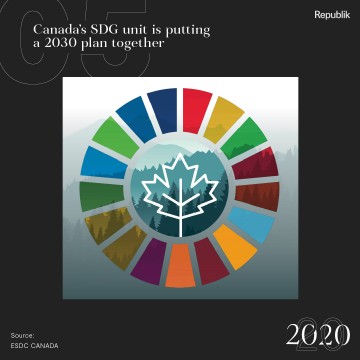
6. For change to happen at scale, systems need to change
For the sustainable business movement to rapidly become the norm in Canada and across the globe, things need to be addressed at the systemic level.
An example of systemic innovation is the rise of Benefit Corporations, a new legal entity with a stated purpose statement, a duty to disclose a yearly benefit report and an enlarged governance duties to consider all stakeholders. This new legal framework is active in 35 states and since 2019, in British Columbia under the designation of Benefit Companies.
A network-based example is Alliance 2030, a national movement of over 1500 member organizations, institutions, and individuals committed to achieving the SDGs.
On a provincial level, Accélérer 2030, a Quebec-led Consortium is set to launch on March 20 2020, to accelerate the 2030 agenda in the province.
Our country’s efforts need to be focused on initiatives with large scale potential at different levels of the economy.

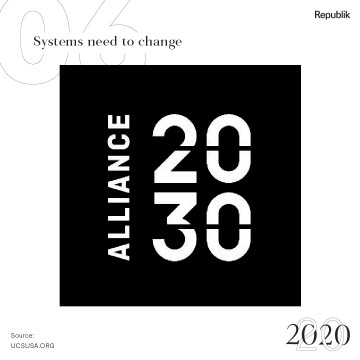
7. We need Capitalism to drive sustainability into action
Contrary to the popular saying, it is believed that what got us here has to get us there.
Too many influential institutions, organizations and people have interests in capitalism to remain the baseline system of our economy.
“Capitalism needs to be managed, not defeated. No other system comes close to delivering the innovations and economic growth that capitalism has sparked around the world. ” - Bill Gates
However, it is important to challenge ourselves to ensure that we are not perpetuating the problems we seek to solve in the existing systems of power imbalances.
Recognizing the importance of sustainability and its opportunities is now easy for capitalists. We need to be more visionary and transformational than that. Thought leaders are pointing to Regenerative Capitalism as part of the answer. (See statement #18)

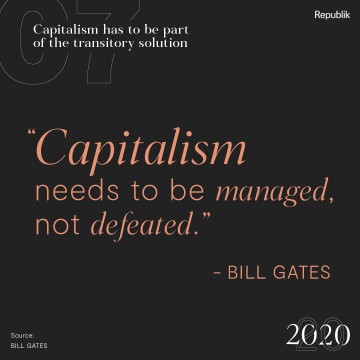
8. Stakeholder based capitalism is finally the new norm
As of now, you’ve probably heard of the triple bottom line and the notion of balancing profit with planet and people.
“The purpose of a company should move away from shareholder primacy, to include a commitment to all stakeholders.”
This statement by a business roundtable of 182 high profile American CEOs shows that stakeholder capitalism is finally on its way to becoming mainstream.
Even though John Elkington, the thought leader who coined the term triple bottom-line 30 years ago, has now reframed the question - given it had become a reporting framework rather than a real-world impact progress benchmark - stakeholder-based capitalism is still one of the most accessible form of self-improvement businesses can act on today.
With free-to-use tools such as B-Corp’s Impact Assessment, understanding your organization’s impact on its stakeholders has never been more accessible.
Another tool businesses should look into is the Future Fit Business, a set of free tools developed to help businesses transform and thrive in the 21st century.

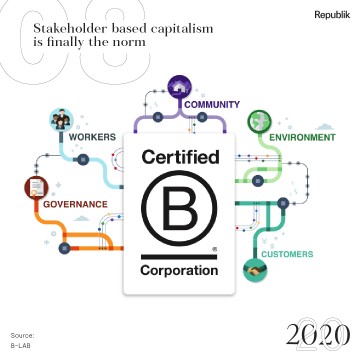
9. Businesses have a role to play and their purpose should guide them
“A company cannot achieve long-term profits without embracing purpose.”
Coming from Black Rock, the world’s largest asset management firm, this quote can help move mountains in the for-profit sector.
Now that sustainability has started to move from a siloed CSR department to a business strategy prerogative, brand purpose should become a corporate baseline.
There’s a unique opportunity for businesses to tie their sustainability efforts to their brand narrative, by adopting a coherent and inspiring vision that affects both their value offering, their stakeholder relations and their internal and external communication.
A couple of great examples are IKEA, Unilever, Danone, Aldo and Maple Leaf Foods, who have successfully tied their narrative to a concrete transition plan.
Businesses have a role to play, and we’re here to help.

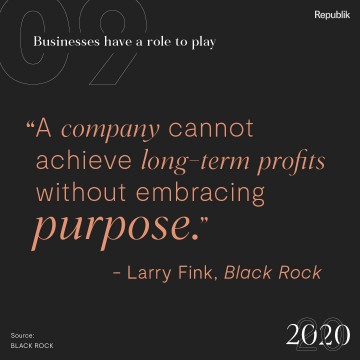
10. Extra financial information needs to become mandatory corporate disclosure
Investors have finally understood the necessity to incorporate social & environmental risk in evaluating a business’s financial viability over the long term, slowly shifting towards impact investing and extra-financial disclosure.
As markets follow capital, companies will adapt in order to attract investments.
Since 2017, France has made it mandatory for businesses - private and public with revenues of over 50M - to disclose extra-financial information as part of their yearly disclosure processes.
The Harvard Business School is running the Impact Weighed Account Project whose ambition is to create accounting statements that transparently capture external impacts in a way that drives investor and managerial decision making.
The Task Force on Climate-Related Financial Disclosure and the Global Reporting Initiative are developing reporting frameworks for these new reporting methodologies to be structured and actionable.
Meanwhile, emerging fin-tech startups such as the IMPAK French40 index are developing robust tools to go from disclosure to measurement to benchmarking.
→ If Canadian disclosure policies evolved to include extra-financial disclosure for all businesses, markets would truly change at scale.

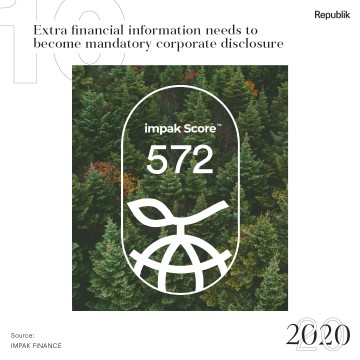
11. Philanthropic capital needs to flow out of philanthropy
Most purpose-driven businesses need long term passive capital to support their growth and the financial sector is mostly geared towards short term returns.
As of today, the Canadian Tax Law limits charities to disburse funds only to qualified donees. This definition needs to evolve to include social purpose organizations & benefit corporations as potential beneficiaries of charitable investments.
Philanthropic Foundations Canada is already open to discussing the matter while the McConnell Foundation recently launched their first social finance accelerator, and firms such as SDG Capital are actively developing the sector.
Tax COOP, the world’s first international tax summit is happening in Montreal this next October and will provide a great platform to explore how these new concepts can actually happen at a global scale.
→ If purpose-driven startups had access to long term passive capital, impact-positive sectors would emerge faster and dormant philanthropic capital would be directed towards mission-aligned initiatives.

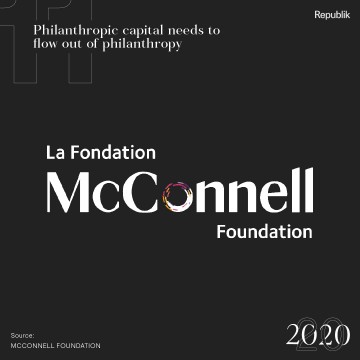
12. Procurement guidelines need to evolve to include sustainability criteria
Most major corporations, including government institutions, attribute contracts through procurement departments who develop Request for Proposals based on a given set of criteria.
As of today, most industries do not include environmental or social criteria in their procurement processes.
In fact, some RFPs are so outdated that some groundbreaking circular companies are not even allowed to submit proposals because their technologies are more advanced than the system permits.
The UN Global Compact recently released a sustainable procurement toolkit that can serve as a good starting point.
→ If major organizations and the government considered sustainability in their procurement, they would accelerate the transition of their entire value chain.

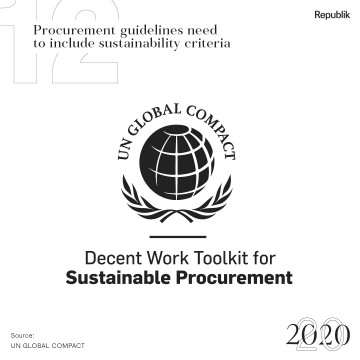
13. Continuous professional education need to include sustainability principles
Our professionals are the foundation of many guiding principles of our democratic economy. Continuous education is mandatory for these professionals to keep their title, thus providing a great platform for evolutive change at scale.
CPA Canada recently announced its intention to rethink how extra-financial disclosure will affect their profession, by aligning their climate change efforts with 14 accounting bodies globally - representing 2.5 million accountants in 181 countries.
Competent boards is currently developing new tools to better provide insights to boards, investors and executives across Canada on climate change-related issues.
→ If our most trusted business professionals had a mandatory baseline education on key sustainability issues relevant to their sectors, organizations would be better advised to face the next decade.

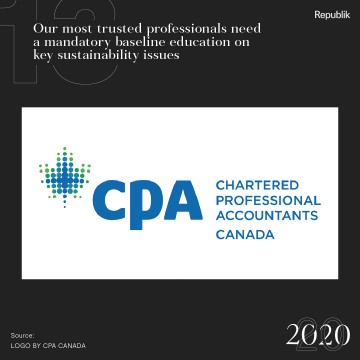
14. Business schools need to include sustainability in their curriculum
Today’s students are tomorrow’s leaders.
The future of our country is in their hands and it’s a good thing given they’re unbiased by the system’s patterns, highly concerned by their future and idealistic enough to think new premises are indeed possible.
Problem is, post-secondary education is not teaching sustainability basics to address tomorrow’s challenges.
Example of active initiatives include the Canadian Business Youth Council for Sustainable Development, formed to unite Canadian undergraduate student organizations in sustainable business in order to grow the movement across the country, and Enactus Canada, a community of entrepreneurial leaders who see business as a way to address social issues .
Another example is Leading change, a nation-wide movement of young leaders and sustainability professionals is accelerating action on issues that are critical to attaining a sustainable, prosperous, and socially just future within a generation.
Rankings have also emerged to identify the most progressive business schools when it comes to sustainability.
The Positive Impact Rating is a new rating conducted by students around the world to assess their business schools on how they perceive their positive impact in the world.
The 2019 Better World MBA Ranking by Corporate Knights lists the top 100, with 6 Canadian schools figuring in the top 25.
→ If all business schools were teaching sustainability principles, thousands of students would enter the workforce and spur sustainable innovation in their new organizations.

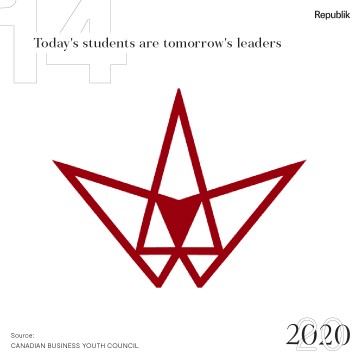
15. The business sectors need to collaborate for change to accelerate
By applying the open-source philosophy to its patents in 2014, Tesla demonstrated that sharing knowledge can accelerate an entire industry’s transition.
"If we can standardize recyclable tubes among all companies, we all win.” - Colgate-Palmolive CEO Noel Wallace
As we’re now facing sector-level challenges, unprecedented collaboration is needed.
In this train of thought, leading Canadian plastic companies have just formed the Circular Plastic Taskforce to truly accelerate change.
As most industries are either run or influenced by trade associations, chambers of commerce and other sectoral associations, these convening organizations present a great entry-point for new ideologies to enter the market.
→ If competitors start collaborating and sharing innovation, entire industries would evolve to put these climate-related issues behind us.

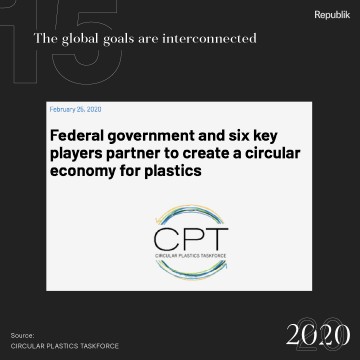
16. Consumers need to be more informed
A consumer asking the right questions forces companies to have an answer.
66% of global consumers say they’re willing to pay more for sustainable brands. - Nielsen
The problem is, each question implies complicated tradeoffs and it’s sometimes hard for a consumer to know what’s true, what’s feasible and what’s right.
This supports the case for the SDGs as a guiding framework, as its iconography and copywriting was thought with the end consumer in mind.
With consumer trust in decline, organizations will have to walk the talk for consumers to believe they’re not greenwashing.
→ If consumers were more informed and made better purchasing decisions, they would change the demand and put pressure on companies to adjust.

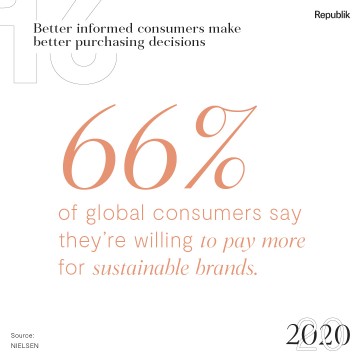
17. Responsible consumption requires better recycling infrastructure
With more informed consumers making better decisions, the pressure will be on corporations to better manage their value chain, and align their efforts with SDG number 12.
- LUSH is providing their consumers with an option for packaged or unpackaged products, claiming 35% of their products sold are packaging free.
- Others such as HP are revisiting their products' materials to include more ocean-bound recycled plastic.
- Keurig Dr Pepper Canada is actively developing compostable coffee pods, but through an open dialogue with municipalities, they’ve discovered that the systems in place would not be able to process such an innovation, with pods most likely to end with trash.
Given we’ve been sending out our collected trash overseas to Asia for most of the past 30 years, our capacity to truly manage it locally is deficient. This needs to change.
→ If recycling & composting infrastructure at the municipal level were more developed, we could pressure the producers to innovate faster.

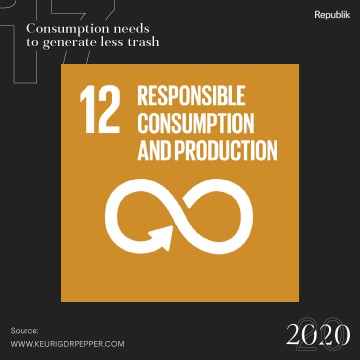
18. Towards regenerativeness: Applying nature-based principles to our economic problems
Our capitalism system’s excessive extractiveness has proven its limits and it’ll eventually be time for a new set of rules to dictate the game.
Regenerative capitalism is a new evolutionary economic concept developed by Canadian economist John Fullerton. It starts with a single core idea:
The universal patterns and principles the cosmos uses to build stable, healthy, and
sustainable systems throughout the real world can and must be used as a model for
economic-system design.
In the same train of thought, the World Wildlife Foundation also produced a very insightful documentary on nature-based principles’ potential to solve some of our world’s biggest problems.
→ If we lived within planetary boundaries, the planet would put its regenerative power to work.

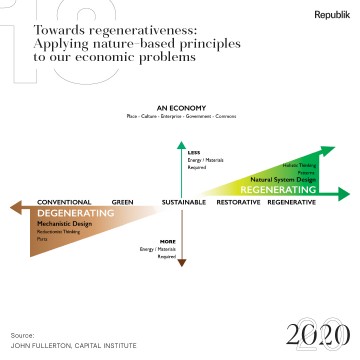
19. Open dialogue with indigenous communities
For true regenerativeness to happen, we need to approach life on earth with a different temporality mindset and with a little dose of humility.
Experts in the sector point to collaborative leadership models, true co-creation, and mindfulness as tools for social innovation and transformation inherent in Indigenous ways of knowing.
Indigenous communities have, for centuries, demonstrated a capacity to interact with our planet without killing it.
Leaving no one behind is more than the guiding principle of the United Nation’s when developing the SDGs, it’s also an opportunity to better understand the root problems, and find lasting solutions.
→ If indigenous communities were an integral part of the answer, we could reframe our temporality mindset to balance the planet into our existing equation.

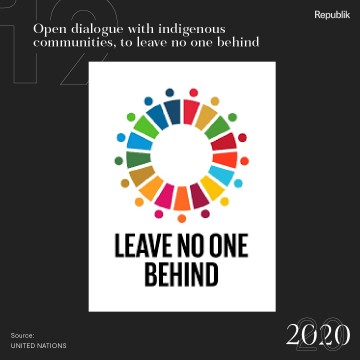
20. It’s a challenge we can take on if we start asking tough questions
If dealing with each of the 17 SDGs alone wasn’t a complicated enough task itself, we need to consider that actions on one SDG have repercussions across all of them.
These global goals are interconnected. Change will not happen overnight. Tradeoffs are necessary. For example, bringing people out of poverty will mean more consumption.
We need to think in a holistic manner as the economy is dependent on how society is doing, and society operates within the biosphere.
What is the risk of aiming for the SDGs if we’re not staying within our given planetary boundaries?

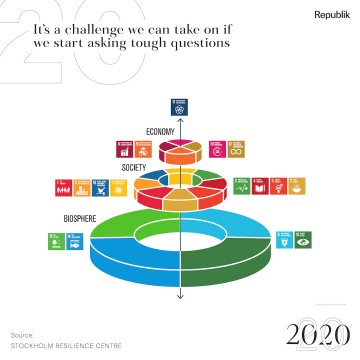
If this is the greatest challenge of our time, it also means it’s the greatest opportunity.
As consumers, it’s an opportunity to make the right purchasing decisions.
As employees, it’s an opportunity to challenge old mentalities.
As businesses, it’s an opportunity to rethink what product innovation truly stands for.
As networks, it’s an opportunity to share best practices and elevate entire industries.
As countries, it’s an opportunity to adopt a long term mindset and include marginalized & indigenous communities in the solution.
As a planet, it’s an opportunity to understand our boundaries and to live within them.
As humans, it’s an opportunity to be the change we wish to see in the world.
If you learned something, please share this article so others can learn too.

